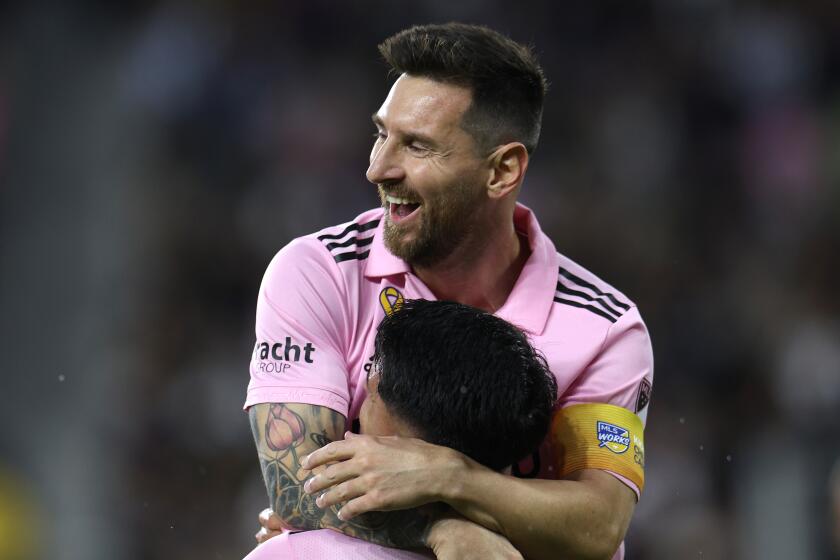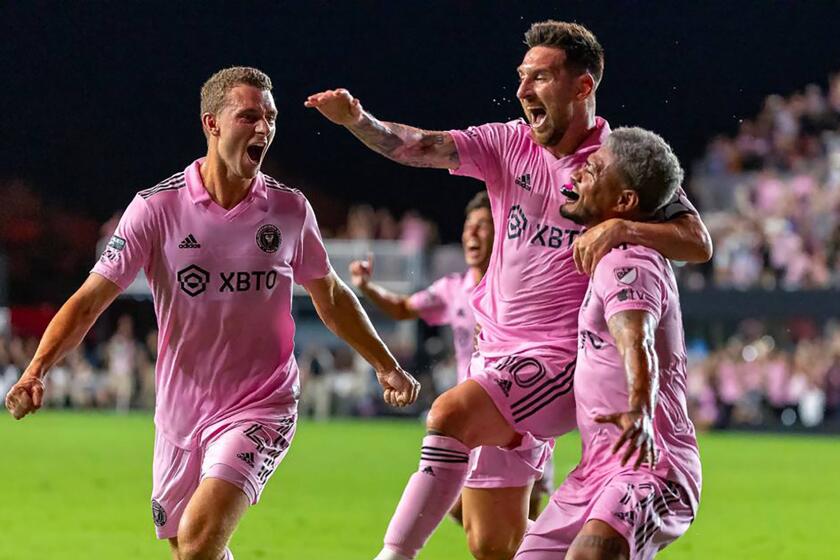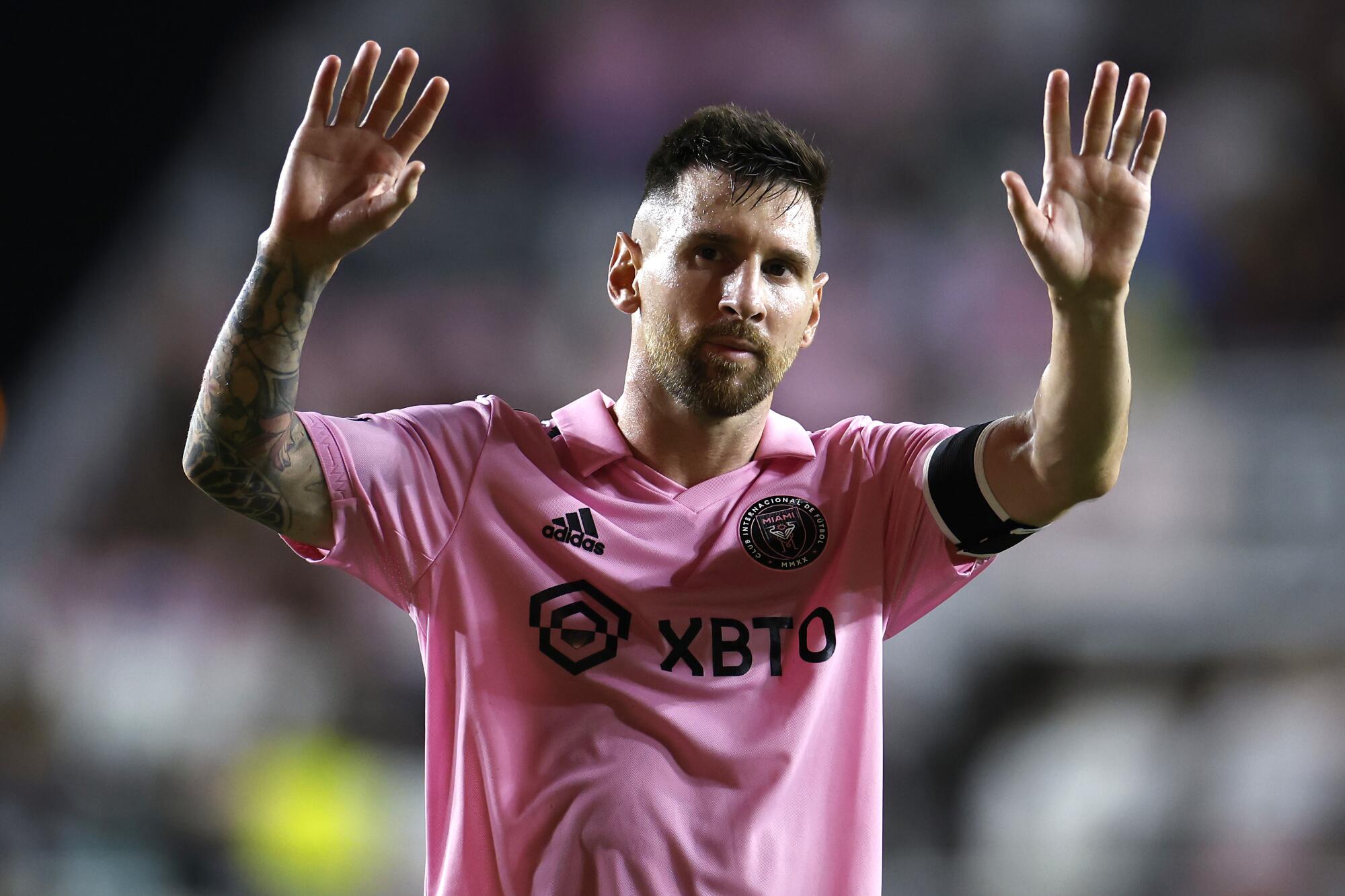
- Share via
Giorgio Chiellini greeted the question with a furrowed brow and a wide smile.
How do you stop Lionel Messi, he was asked. For Chiellini, it was as if he had been asked how to swim without getting wet.
“I tried to do it. Sometimes it works, sometimes no,” the LAFC center back said. “One thing is sure: you cannot stop him with just one man. It’s impossible.”
That’s the painful lesson teams across North America have learned since Messi, arguably the greatest soccer player of all time, joined MLS with Inter Miami in late July. In 10 games spread across three competitions — the Leagues Cup, U.S. Open Cup and MLS regular season — Messi has 11 goals and six assists in 804 minutes, contributing to a score every 47 minutes.
Before Messi, Inter Miami was 8-14-4, averaging 1.08 goals a game. With him, the team has gone 6-0-4 and averaged 2.7 goals a game. His success has transformed not just a team, but the entire league. On Sunday, however, he’ll get a stern test when LAFC, the reigning MLS and Supporters’ Shield champion, becomes the latest team to try to do the impossible by stopping him.
As for why that’s impossible, the theories differ.
The buzz began more than 30 minutes before kickoff when the best soccer player in the world led his team on to the field for warm-ups to the flash of hundreds of cellphone cameras. The Lionel Messi Show had arrived in Los Angeles.
“It’s difficult to describe what is his best strength. Unique players do unique things,” said LAFC captain Carlos Vela, who faced Messi more than a dozen times in Spain and with the Mexican national team.
“Obviously his ability and the way he plays,” added LAFC coach Steve Cherundolo who helped the U.S. hold a young Messi scoreless in a 2008 friendly with Argentina. “It’s an illusion to try to think you’re going to stop him for 90 minutes. He’s going to have a chance or two. That’s just the way this game works and [what] he’s been able to do throughout his career against every team.”
For Chiellini, the answer is not of this world.
“He’s an extraterrestrial,” he said. “He’s not like a normal guy.”
“He was and he is so really different from other players,” he continued. “It’s like LeBron or Jordan. They are different from the other ones.”
Chiellini, widely regarded as the best defender of his era, is the rare player who has been able to tame E.T., holding him scoreless in their last three meetings for club and country. Yet as good as the Argentine legend is, Chiellini said LAFC can’t afford to worry only about him Sunday. When Messi arrived from Europe, he was followed by former Barcelona teammates Jordi Alba and Sergio Busquets, world and European champions in their own right. They joined a team that already had former MLS scoring champion Josef Martínez and World Cup veterans DeAndre Yedlin and Kamal Miller.
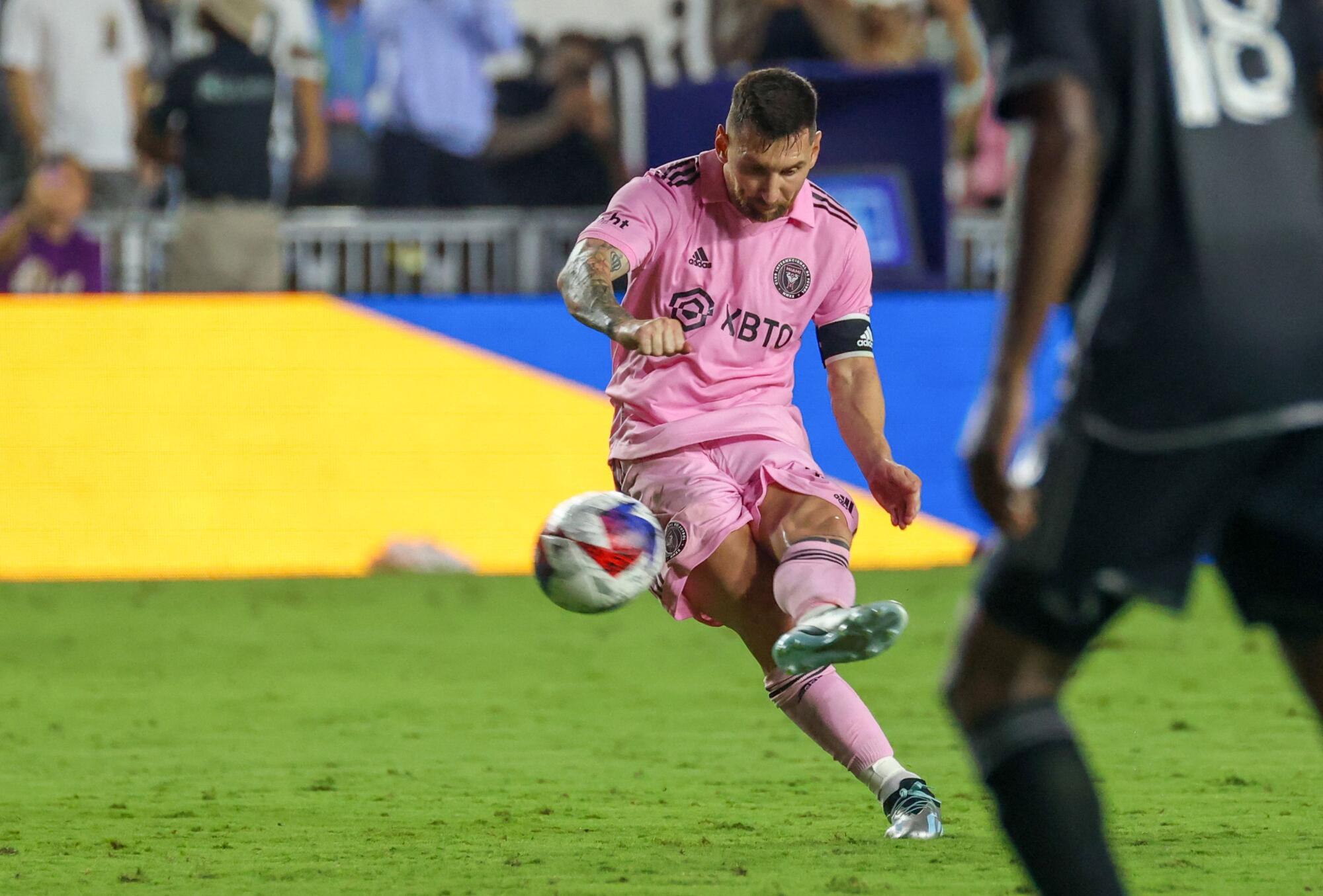
Less than a month before the Barcelona trio arrived, Inter Miami sacked manager Phil Neville and replaced him with Tata Martino, who won an MLS Cup with Atlanta after coaching Messi and Co. to two trophies in Spain. The team, Chiellini emphasized, is more than just one player.
“We have to respect that. But we don’t have to be scared of them,” he said. “We cannot focus just on Messi. The game is LAFC against Miami.
“Miami built a strong team. [The new players] are like cherries on the top of the cake, but the cake was good in the last month.”
However, Messi, a seven-time world player of the year, is the one everybody is coming to BMO Stadium to see — in some cases paying an average of $717 on the secondary market for the privilege, making Sunday’s game the most expensive in MLS history, according to the online marketplace TickPick. That price is just $31 less than what it would cost to attend every Chargers home game at SoFi Stadium this season. One buyer spent nearly 10 times as much, purchasing three field-level seats for $2,339 each.
In his short and unbeaten stay in MLS, Messi has more than justified the hype, scoring in eight of 10 games in all competitions. For his career, his 818 goals for club and country rank second all-time to Cristiano Ronaldo, and Messi is the only player in history with more than 400 career assists.
Last season, his final one with Paris Saint-Germain, Messi was the only player in Europe’s top five leagues to record 20 goals and 20 assists — and he sandwiched that around a remarkable World Cup in which he willed Argentina to a title, scoring seven goals in as many games to win the Golden Ball as the outstanding player for the second time in three tournaments.
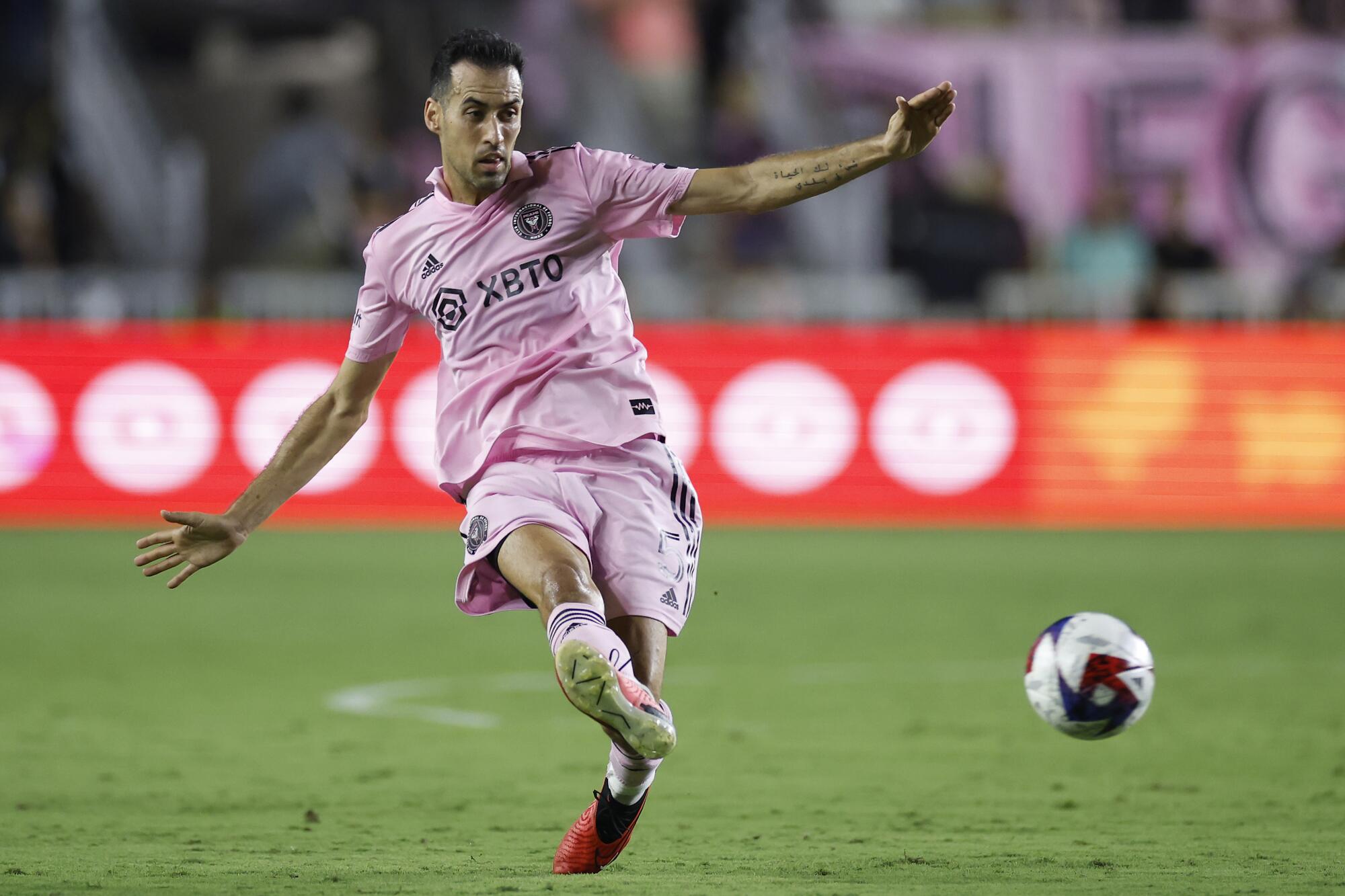
Now he’s working his Messi Magic with Inter Miami, which was last in the 29-team MLS table when he arrived, but is unbeaten in a franchise-record 10 games since. Which begs a question: Is Messi, at 36, too good for MLS?
“Messi is the best player of all time. So we shouldn’t be surprised that he’s come into MLS and dominated,” said former Galaxy midfielder Sacha Kljestan, now an Apple TV analyst. “He’s dominated against every defense he’s ever played against. But Messi is not doing this on his own.
“He’s scoring goals because he’s being put into good positions with the likes of Sergio Busquets and Jordi Alba, who have helped raise the level of everybody around them.”
Messi’s game has changed, though. Although he stands just 5-foot-7 — and that’s a stretch — he remains the biggest man of the field by relying more on his smarts and tactical awareness than any physical attributes, though his left leg remains deadly from just about any spot in the attacking third. At times he appears to be walking through games, seemingly uninterested in anything happening around him.
Yet when an opening presents itself, he almost always winds up in the right place to pounce on the opportunity.
“The role he plays in each team is important to allow him to use his football IQ to find the right spots at the right moments,” Cherundolo said. “Couple that with his technique and his physical abilities, [it] makes him the best player in the world. Not everybody in the modern game has those abilities, to earn the right to walk around but to affect the game in such a manner offensively. So that makes [him] a little dangerous and tricky.”
Trying to see Lionel Messi and Inter Miami take on LAFC this weekend? A ticket could set you back at least $500.
Added Chiellini: “He could seem sleepy for 85 of 90 minutes, but in that five minutes he could be devastating. That’s a top player.”
His effect on MLS over the last two months can’t be overstated.
Apple TV, the league’s broadcast partner, which is helping pay the $150 million that Messi will reportedly earn over the next 2½ years, has doubled the number of subscribers to its MLS Season Pass streaming service, to more than 2 million, since Messi joined the league. The team, long stalled in negotiations over a 25,000-seat soccer-specific stadium in Miami, announced last week that construction has begun on a $1-billion sports and entertainment complex next to the city’s airport. The stadium is scheduled to open in 2025, the final season of Messi’s contract.
The team’s Instagram following, which was about 1 million entering the summer, is now approaching 15 million, trailing only the Golden State Warriors, the Lakers and the Cleveland Cavaliers among U.S. pro sports franchises. And Messi’s pink MLS jersey, with the logo of the crypto finance company XBTO across the chest, set a sales record in the 24 hours after his signing.
Last in the league in attendance last season, Inter Miami now plays to standing-room-only audiences wherever it goes, making it the closest thing MLS has to a rock band, with the bearded Messi as both the frontman and lead guitarist. Which is why Messi has his own hulking bodyguard, a former Navy SEAL identified as Yassine Chueko.
If Inter Miami, which had a losing record and no playoff wins through its first three seasons, was little known in much of the world before Messi signed, it’s now mentioned alongside global giants Barcelona and PSG, the other clubs for which Messi has played.
“This is a big step for the league, that takes the league to a new level,” said Kljestan, who made his MLS debut a year before David Beckham did.
“There was a moment in MLS before David Beckham came, and then after. And I think there’s a before Messi came and now after.”
When Beckham signed with the Galaxy in 2007, MLS changed its financial structure, allowing teams to sign three designated players whose salaries did not count against the league’s frugal salary cap. Over the next 15 seasons, players such as Kaká, Zlatan Ibrahimovic, Steven Gerrard, Thierry Henry, Wayne Rooney, Robbie Keane, Javier Hernández and Gareth Bale followed Beckham to the U.S.
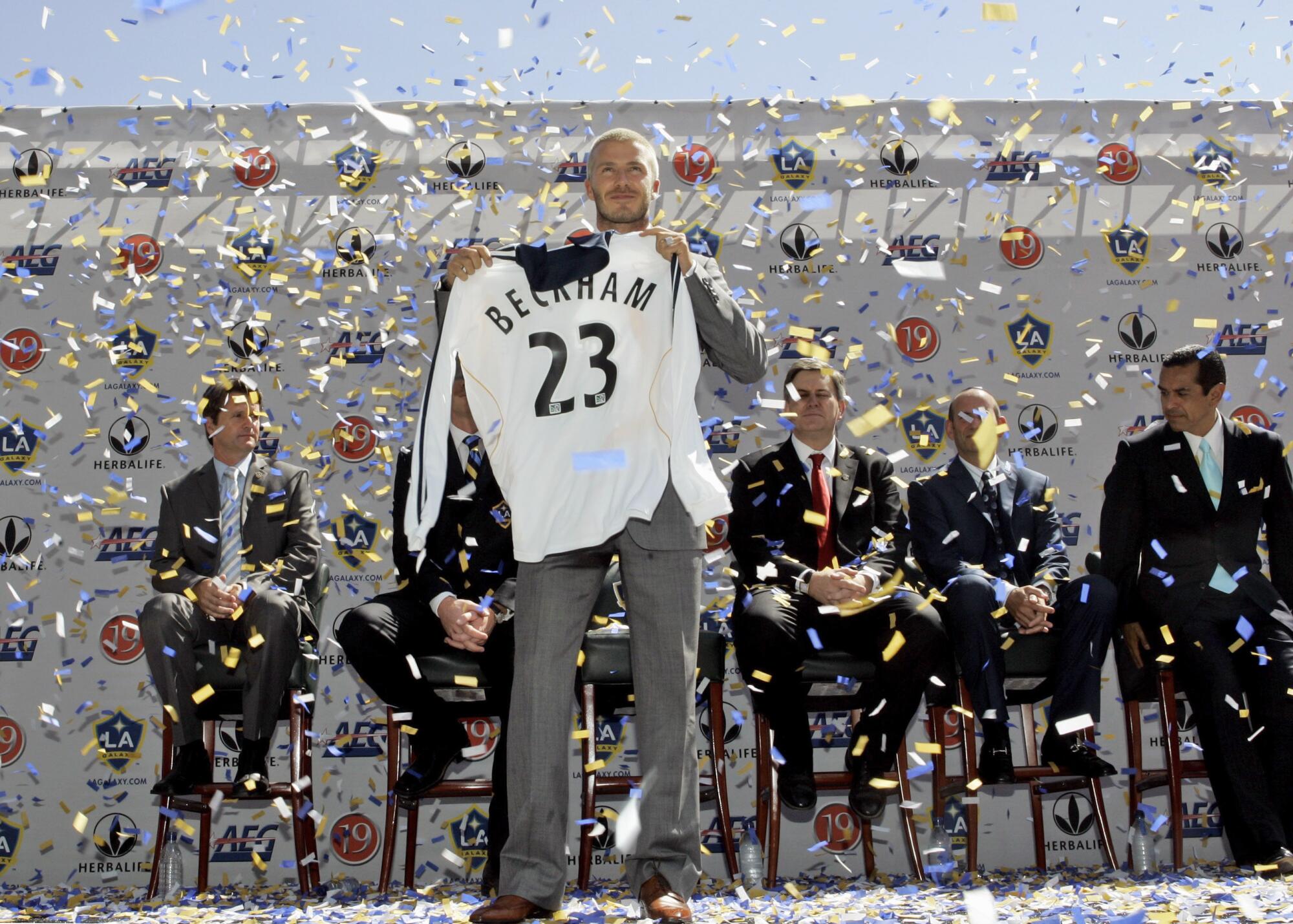
Beckham put down roots in MLS, becoming an owner of the Miami expansion team that debuted in 2020 and had little success until Messi arrived.
Now other players, such as World Cup champion Antoine Griezmann, another former Barcelona teammate, said they want to join Messi in the U.S. What once was a trickle could soon become a flood.
“Plenty of other stars around the world are going to see Messi coming here, dominating, but also having fun and enjoying his life off the field. That’s a big draw,” Kljestan said.
Chiellini agrees, which is why he thinks Messi will continue having a positive influence on MLS long after the Argentine superstar retires — maybe to his condo in South Florida.
“He’s happy,” said Chiellini, a European champion, Italian national team captain and nine-time Serie A winner with Juventus. “I have the same happiness. We played, players like us, a lot of years with pressure and here we discover many other aspects of life that you can really enjoy. I saw him in the grocery store with his family, something that is not possible in Europe.
“You could really enjoy much more the life. It’s really a good choice to come here.”
But now that he’s here, how do you stop him? Chiellini furrowed his brow and smiled again.
“It’s not possible,” he said. ”We’ll need an effort from all the team. It’s the only way that could work.”
More to Read
Go beyond the scoreboard
Get the latest on L.A.'s teams in the daily Sports Report newsletter.
You may occasionally receive promotional content from the Los Angeles Times.

